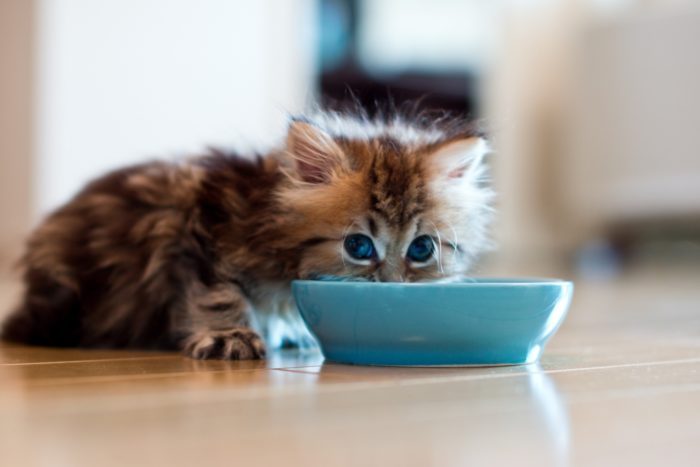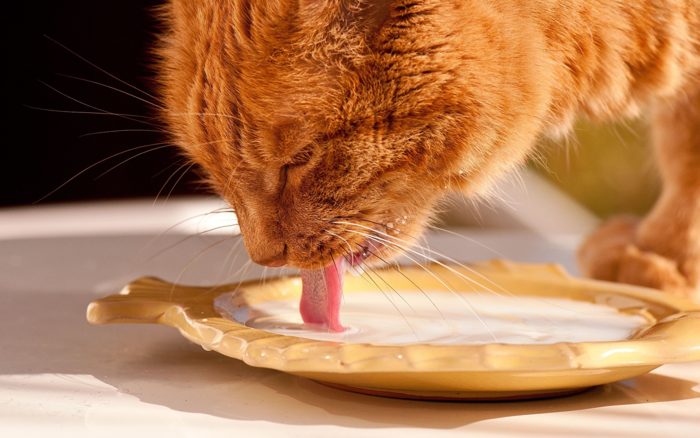Diarrhea in animals is always a pretty serious symptom that can signal the development of any diseases, infections, systemic-functional malfunctions in the body.
Intestinal disorder in small animals, as in adult cats, can be caused by a variety of causes, namely: a sharp change in diet, food allergy, stale, poor-quality fodders, endoparasites (worms), congenital pathologies. In some cases diarrhea can occur in the kitten from milk. In this case, indigestion causes both store and breast milk, which babies receive from the cat-mother. What to do and how to stop? Than to treat the pet at home.
Contents
Causes of diarrhea
Diarrhea in kittens is a condition that is characterized by frequent bowel movements of a watery cough-like consistency. In the excrement there may be mucus, foam, particles of not digested food, bloody fragments (clots, filaments, inclusions). An upset stomach can be acute and chronic.
Important! Diarrhea for newborns, monthly kittens is a very disturbing symptom that can not be ignored. If the kitten is more than two days old, acute indigestion leads to various systemic failures in the body, severe consequences for the condition and health of the baby.
If the kitten began to vilify after drinking milk, such an unpleasant state is caused by lactose intolerance, which is explained by the inability of the intestines to digest milk sugar, as well as congenital abnormalities of the gastrointestinal tract. Some kittens report allergic reactions to the protein contained in cow’s milk. In addition to fermented diarrhea from milk, note vomiting, nausea, decreased activity, mucosal anemia.
It should be noted that the intestinal frustration of a small pet does not always provoke dairy products. Possible causes of acute diarrhea include:
- helminthic invasion;
- poisoning;
- poor-quality formula, artificial nutrition;
- congenital pathologies of the digestive tract;
- dysbiosis;
- binge eating;
- genetic, pedigree pathologies;
- decreased immunity;
- a sharp change in diet, diet;
- chronic kidney disease;
- virus-bacterial diseases, infections;
- neoplasms in the intestine.
In small kittens, diarrhea most often occurs because of poor-quality milk formulas, too fatty or raw (unboiled) milk, if the pet is on artificial feeding. The gastrointestinal tract of small animals, unlike adult cats, is not fully populated with a useful flora that takes part in digestion processes.
Important! Diarrhea, regardless of its underlying cause, is not an independent disease, but is a symptom of any disease, pathology, systemic and functional disorders in the body.
Diarrhea in kittens from milk also happens with a sharp transition from breastfeeding to artificial feeding. If the pet, in addition to purchased milk receives complementary food, acute diarrhea is often caused by a sharp change in diet, diet. Overfeeding, too fatty dairy products also provoke acute diarrhea in the monthly kittens.
Other causes of diarrhea
Worms, internal parasites that can be localized in various internal organs, not only provoke stomach upset in small animals, but also lead to various systemic failures in the animals.
If mucus, foam, blood is present in the bowel movements, the tummy is enlarged, the pet becomes inactive, quickly loses weight, looks drained, these symptoms indicate infection with worms. Other signs of helminthiosis include vomiting, nausea, deterioration of the coat, anemia of mucous membranes, refusal to feed.
Infect the kittens from the cat’s mother, as the eggs of parasites can be on the fur of the wet nurse. Infection with endoparasites is also possible in the transplacental way, during intrauterine development.
Diarrhea from milk in kittens develops against a background of pancreatitis, gastroenteritis, in which inflammation affects the intestinal mucosa, the stomach. Viral, bacterial infections (chlamydia, calciviroz, herpes viral infection) can also provoke acute intestinal frustration in kittens.
Diarrhea in newborn kittens
In the first months of their life, the main food that newborn babies receive is the mother’s breast milk. With him, babies receive the necessary nutrients, protective antibodies. Therefore diarrhea from breast milk is noted in newborn pets in extremely rare cases (congenital pathologies, lactose intolerance).
Diarrhea from breast milk in kittens is noted in the event that the cat is infected with viruses, bacteria, protozoa microorganisms. In this case, do not forget if the mother of the cat is infected, the pathogenic flora penetrates into the milk and can cause them to become infected.
Diarrhea in newborn kittens from breast milk is noted if the cat has serous, purulent mastitis, inflammation in the organs of the reproductive system. In colostrum, milk can be pus, fibrin flakes, other inclusions that cause indigestion in kittens.
If a cat receives poor-quality feeding, an unbalanced meager diet, foul, stale foods, it can cause poisoning in the pitoma. Feeding poor-quality fodders reduces nutritional value, changing the composition of breast milk, so kittens can constantly vilify because of the food they receive.
If a cat receives medicinal products during the lactation period, the components that make up the medicines fall into the milk, which also leads to an intestinal disorder in infants fed breastfeeding. If newborns, the monthly kittens are on artificial feeding. upset stomach causes a sharp change in diet, overfeed, low-quality milk formula.
Clinical manifestations of diarrhea
Acute, chronic diarrhea, in addition to frequent bowel movements, feces of watery consistency may be accompanied by other symptoms, among which:
- anemia, icterus of mucous membranes;
- lethargy, apathy;
- an increase in the tenderness of the tummy;
- increase, decrease in temperature;
- painful defecation, urination;
- expiration from the nose, eyes;
- refusal to eat, complete lack of appetite;
- poor condition of the fur coat.
Important! The clinical picture of diarrhea, the intensity of the manifestation of a symptom depends on the underlying cause, which provoked intestinal disorder, age, individual characteristics of the organism.
Do not forget that diarrhea, which lasts more than two or three days, poses a mortal danger for small pets. Diarrhea removes beneficial substances from the body, disrupts metabolism, electrolyte-water balance, provokes intoxication, dehydration (dehydration). Therefore, if you notice that the kitten is suffering from breastfeeding, store milk, milk mixtures, you need to consult with the veterinarian as quickly as possible and provide the pet with qualified help.
Treatment
Before starting treatment for diarrhea, you need to establish the root cause. Analyze, after which the pet began to vilify, and whether the indigestion was always after the consumption of milk.
Advice! With diarrhea, a veterinarian should prescribe treatment for small kittens. Self-medication, uncontrolled use of drugs can cause complications. The choice of treatment methods depends on the underlying cause of diarrhea.
If a kitten suffers, first of all you need to put the baby on a 6-12 hour hunger diet. From the diet completely exclude dairy products, any other feed that the cat receives. In this case, the pet should have free access to fresh boiled drinking water.
If the cat was fed from breast milk, it is necessary to isolate it from the cat-matter and after the diet until the state of the lactating female is normalized, transferred to artificial nutrition, and substitutes for cat milk. Feed your baby in small portions at the same time. Food should be nutritious, easily digestible, fresh.
If a kitten sucks from milk, milk formulas, reconsider his diet. Consider the quality, fat content of dairy products. Perhaps the baby does not fit your diet. Consult with the veterinarian. A specialist will pick up special feeds or assign a different type of food to the pet.
Important! In case of allergic diarrhea caused by milk components, the allergen-provoking food products are completely removed from the diet. The kitten is kept on a diet, after which new food is introduced gradually in small portions.
With diarrhea, you can give the pet activated charcoal (white, black) at the rate of 1/3 of the tablet per 10 kg of weight. The tablet must be ground into powder and poured into the pit of the animal’s mouth from the syringe without a needle.
To stop diarrhea Smecta, Enterosgel, rice broth, tinctures on the basis of medicinal herbs will help. With a strong diarrhea, strictly adhering to the dosage indicated in the annotation, you can give the kitten Levomycetin. In this case, before using medicines, consult a veterinarian. The specialist will pick up medicines safe for a small pet, prescribe a treatment course.
If diarrhea from milk is provoked by systemic pathologies, infections, helminthiases, kittens are prescribed anti-inflammatory, antibacterial, antiparasitic, restorative drugs, homeopathic remedies. To normalize the intestinal microflora prescribe probiotics, enzymes that improve the digestion of food.




















